Journaling is widely recognized as a tremendously fruitful habit with many emotional and physiological health benefits. But if you’ve never journaled before, knowing how to get started can feel overwhelming and intimidating. In this complete guide to journaling for beginners, Jodi breaks down everything you need to know to successfully launch your new journaling habit.
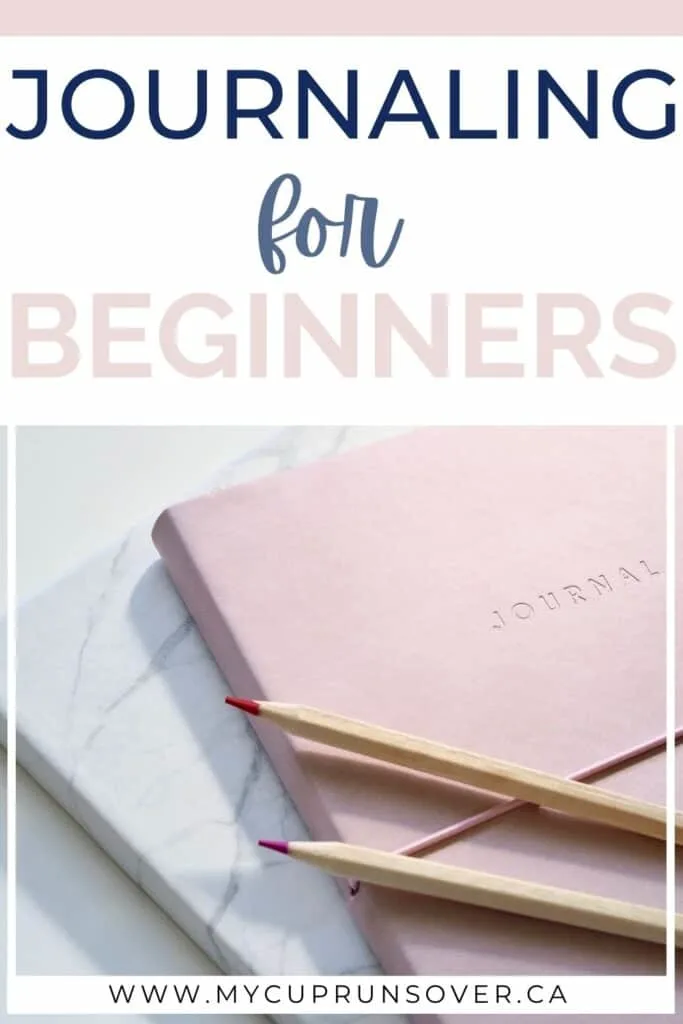
For beginners, journaling may feel a little bit strange at first.
Many would-be journalers wonder whether recording their lives on paper is a worthwhile endeavor, but a journal can be so much more than just a daily log of events.
For some people, it is simply a way of letting out the thoughts and feelings that they would otherwise keep bottled up inside.
For others, it is a personal roadmap for trying to answer deep questions about themselves or for logging their progress when developing a new skill.
Journaling can be all this and more. Your journal is a place to let your creativity and unique personality shine through, especially if you don’t have another avenue for doing so. This is where you get to explore the different recesses of your mind and investigate all the amazing treasures lying in wait there.
In this guide, we’ll talk about the many different types of journaling and how to choose the right one for you. We’ll also go over everything you need to know to get started.
The Benefits of Journaling
Every method of journaling has different benefits but there are a few advantages that span pretty much every style.
Educational Benefits
Whether you’re journaling about current events or just writing out your feelings, the academic benefits are inherent.
Not only are you forced to consider simple skills like spelling and grammar, but the more you practice writing in your journal, the more improvements you’ll notice in your overall writing style.
For kids, keeping a daily journal is a great way to work on language fluency, spelling, and creative writing skills.
Mental Health Benefits
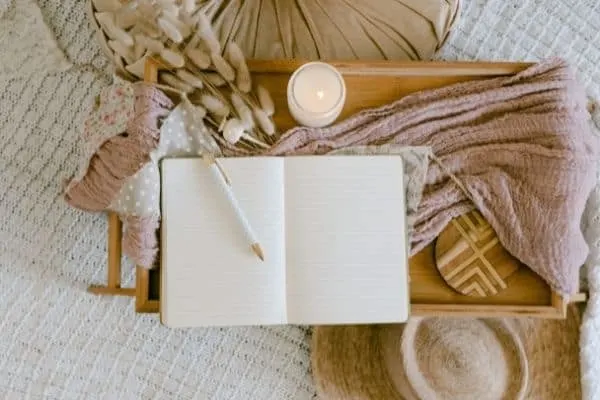
Whether you normally prefer to share your feelings or keep things to yourself, journaling is the perfect outlet for all your unprocessed thoughts and emotions. Keeping a journal allows you to share your thoughts while still keeping them to yourself.
This is likely why so many people believe that journaling is one of the best ways to deal with stress, grief, anxiety, and anger.
Even if you aren’t prone to those types of emotions, you can still reap emotional rewards with the right technique. Gratitude journaling is a great option for centering your mind and heart on the positives in life.
Self-Discipline Benefits
Keeping a journal is a fantastic way to strengthen your willpower.
Not only are you building a new habit, but by setting goals and reflecting on your past entries, you’ll be able to recognize strengths and weaknesses that you may not have noticed if you hadn’t documented them.
What’s the Right Age to Start?
If you’re considering starting a journaling habit with your children, you may wonder if they are really old enough to handle regular journaling.
Research shows that journaling can be beneficial to children as young as kindergarten but in our home, we’ve done forms of journaling as early as three! This post goes into much greater detail about determining the right age to start journaling with your children:
How to Get Started Journaling
What Supplies Do I Need?
Journaling really doesn’t require anything fancy. A simple notebook and a pencil are really all you need.

But have you ever heard the phrase that you’ll only get out of something as much as you put into it? Well, journaling tends to follow that rule pretty well.
Although I don’t recommend going journal-supply-crazy, I would suggest that you grab a few different things that will make you feel excited and inspired to write.
You’ll also want to choose journaling supplies that make the most sense for you. The list below is a good first step for beginners.
Types of Journals
Although there are a lot of different ways to go about journaling, when it comes to the actual products on the market, there are really only a few different types of journals.
Using one of these three types of journals will allow you to journal about anything you want from habit tracking or food journals to dream journals or creative writing journals.
Bullet Journals
Bullet journaling is a new-ish trend that has caught on like wildfire. It’s basically a mixture of journaling and habit tracking.
It comes with its own version of shorthand and most bullet journals have a pre-filled page format to guide your daily documentation.
Guided Journals
A guided journal is a type of journal that typically follows a specific theme and is aimed at some sort of personal development.
One of the best things about guided journals is that you really never have to face the frustration of a blank page. Some journals go as far as to include a devotional-style message each day where others simply offer a journal prompt.
If you’re brand new to journaling and you aren’t sure you’ll have much to write, then that may be a good reason to consider trying out a guided journal experience.
Writing Journals
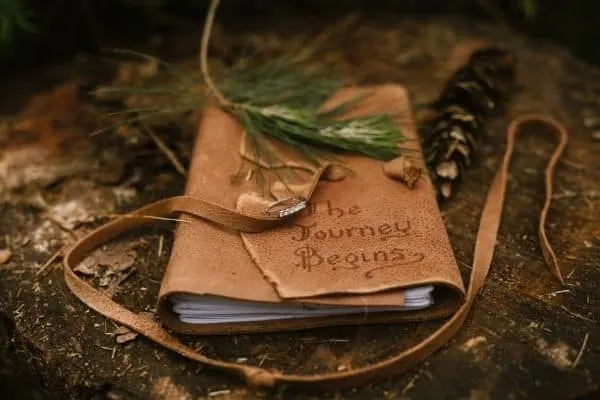
Writing journals are probably what most people picture when they think about journaling. They can be a simple blank notebook, a sketchbook, a leatherbound book, or even a diary with a lock and key.
The main idea of a writing journal is that it’s simply a book filled with blank pages.
What you do with those blank pages is as unlimited as your imagination. Below, we’ll dive a little deeper into what you can/should include in your journal.
If you’re just getting started, I would personally suggest that you go with a simple but beautiful notebook that inspires you to write but doesn’t break the bank.
Pens/Pencils
Buying a quality set of pens can go a long way towards inspiring you to write daily. Personally, I love to fill my journal with multiple different colors of pen because I just love the way it looks.
Some people even choose a single pen color for each day based on their mood for the day. Although having colorful pens isn’t really a requirement, having a set of pens with smooth ink that won’t skip is definitely a must!
Our favorite brand of pen is the simple BIC brand, but since we love colors we always buy the Bic Crystal for journaling. The colors are super vibrant and they have the smoothest stroke we’ve found.
Journal Enhancers
Although these aren’t a requirement, it can definitely be fun to buy a few accessories for your journal. Sometimes it’s the little things that keep us motivated!
My daughter loves using stickers in her diary to create fun designs on her page. She also keeps a cute bookmark available to mark her place.
One thing to consider is how careful you want to be to keep your journal private. If that is something that is particularly important to you, you may want to consider purchasing a locked journal or a lockbox where you can store your regular journal.
Consider Your Why
Like I said above, there are so many reasons to start a journal. But the most important reason is YOURS.

What is it that you hope to achieve by starting a journal? I like to call this my “Big Idea” and I write mine down in the front of each journal.
Over the years, my big idea has changed as I’ve developed more journaling experience. As you grow and mature in your writing, yours will likely change too.
Perhaps you’re simply hoping to build self-discipline.
Maybe you’d like to learn to think more critically about the world around you.
It’s possible that your journal will be a study companion to help you build a new skill or study a new topic.
Or you may just think of your journal as a logbook to document your day or debrief before bed. In this case, your journal is a place where you can record your favorite moments, daily reflections about things that happened throughout the day, and even write down inspirational quotes.
Set an Objective
After you know your why, it can be helpful to create an objective for yourself. This is basically a way to break down your why into something measurable that you can analyze at the end of each month.
Here are a few ideas for objectives you can set for yourself
- Journal daily for 30 days (great for building discipline).
- Respond to a writing prompt each day for 30 days (great for building your writing skills).
- Read and respond to a Bible verse each day for 30 days (great for building spiritual discipline).
- Write a prayer each day for 30 days (great for spiritual growth).
- Record thoughts about current/world events each day for 30 days (great for learning to think critically).
- Record things that made you feel anxious each day for 30 days and consider why you felt that way (great for building cognitive thinking skills).
- Learn and record something new about “x” each day for 30 days (great for building any new skill).
How to Create a Journaling Schedule
Although there is no hard and fast rule about when or how often you should journal, I like to stick to this general guideline: Write Daily, Reflect Weekly, Check-in Monthly.
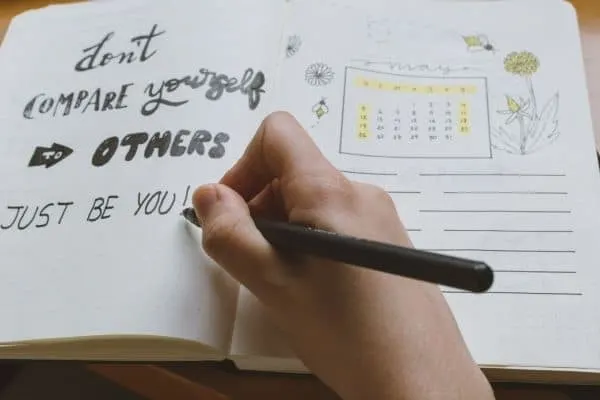
Write Daily
Writing Daily is the schedule most conducive to building a long-lasting habit. It also means that sometimes, you’ll have to journal out of discipline rather than inspiration.
Although inspired writing is usually the best kind, forcing yourself to write in spite of your mood is a great way to build your overall writing skill level and teach you to think critically in all things.
Reflect Weekly
At least once per week, I like to scroll back through my journal and read some of the things I’ve written. Sometimes I read things I wrote recently, and sometimes I’ll go farther back to see how things were going last month or even last year.
Doing this regularly allows you to see how your life changes and how difficult things do tend to work themselves out.
Check-in Monthly
At the end of each month, do a check-in with yourself to analyze your progress and consider what is and isn’t working. Ask yourself some questions like the ones below.
- Did I write more days than I skipped?
- Did I hit my objective this month?
- Did I enjoy my journal this month or did it feel like a duty?
- (If you didn’t enjoy it) – What can I do differently next month to enjoy?
- What benefits did I get out of journaling this month?
Tips for Staying Disciplined
Staying disciplined with any new habit is hard but it absolutely can be done with the right strategy and tools! These are a few of the most important tips for getting and staying disciplined.
Choose a Realistic Time for Writing
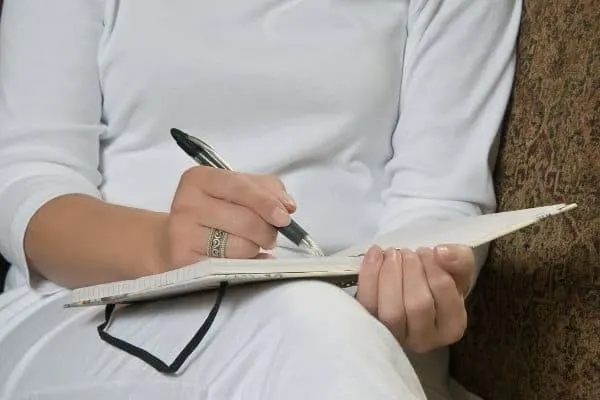
For some people, finding time to write may be the most difficult part of the whole equation and each person will have a different preference when it comes to setting time aside.
For me, I like to do my journaling early in the morning. But I also don’t treat my journal as a daily logbook.
My journaling is a spiritual discipline so I like to spend my quiet time in the morning with my journal and Jesus.
But some people may want to crawl into bed at night and do a “debrief” before closing their eyes. Spilling the events of your day onto paper is a great option for a bedtime brain dump and may just leave you feeling relaxed enough to sleep.
Give Yourself Grace
When I read my childhood journals, at least 1 in 3 pages starts like this “I know it’s been a while since I’ve written but….”
Staying disciplined can be a big challenge. But don’t feel a need to apologize to your journal when you haven’t been writing regularly.
Just start each day fresh and don’t worry about the things that you did imperfectly the last time.
If you find that you are missing more days than you are writing, you may want to reconsider the time slot that you’ve chosen for journaling as it may not be the right fit.
Hold Yourself Accountable
Okay, this may seem like the exact opposite of the last point, but I promise, it’s not. Although you don’t need to get frustrated with yourself for missing days, you should at least try to keep yourself accountable for your new journaling habit.
One way to do that is by putting a habit tracker up in a conspicuous place. Make sure that you put it somewhere that you will see it in your daily routine. Bonus points if you’ll see it right before the time you’ve set aside for journaling.
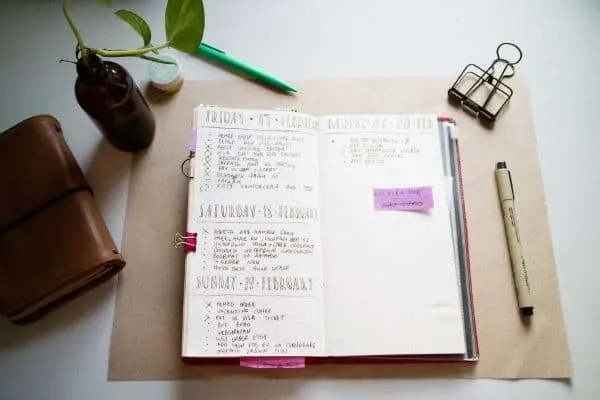
For me, I keep mine on our refrigerator door because I see it when I go to the kitchen to prepare my morning coffee.
If you’re planning to journal before bed, perhaps put yours on your nightstand or stick it to your bathroom mirror where you will see it while you’re brushing your teeth.
Keep an Ideas List in the Back of Your Journal
If you’re anything like me, you’ll be right in the middle of a journal entry when your mind suddenly comes up with the best idea ever.
But if you’re already well into your entry for the day, stopping now probably isn’t the best idea. You’ll end up spending way more time journaling than you had planned.
Instead, use a sticky tab to separate out a section in the last few pages of your journal. In this section, write down those great ideas and save them for days when you’re feeling a bit less inspired.
EXPERT TIP: I also like to keep my planner (or a small notepad) beside me just in case my mind keeps wandering to the tasks I need to complete for the day. If I drop those onto a to-do list quickly, it frees my mind up to focus on my writing.
Write Like You’re Talking to a Friend
When you’re journaling, it can be helpful to picture your journal entry like a letter you’re writing to a friend. But keep in mind, the friend you’re writing to is just a future version of yourself, so feel free to share all of your deepest thoughts and fears.
Don’t Forget to Sign and Date

It may seem silly and a bit formal to sign and date your journal entries, but remember that someday you’ll look back on your entries and you’ll be glad that you have an accurate representation of time.
Your signature isn’t absolutely essential, but since you’re writing your journal like it’s a letter to your future self, it’s only appropriate to sign it.
Plus, in the distant future, after you’ve left this earth, your children may look back on your journals and they’ll likely cherish each signature.
Jodi and her husband Wil live in rural Pennsylvania with their three children. A teacher by trade and a life-long learner at heart, Jodi pivoted her career to work from home when her twin boys were born. Since then, she has founded 2 websites and assisted in the development of many more.

